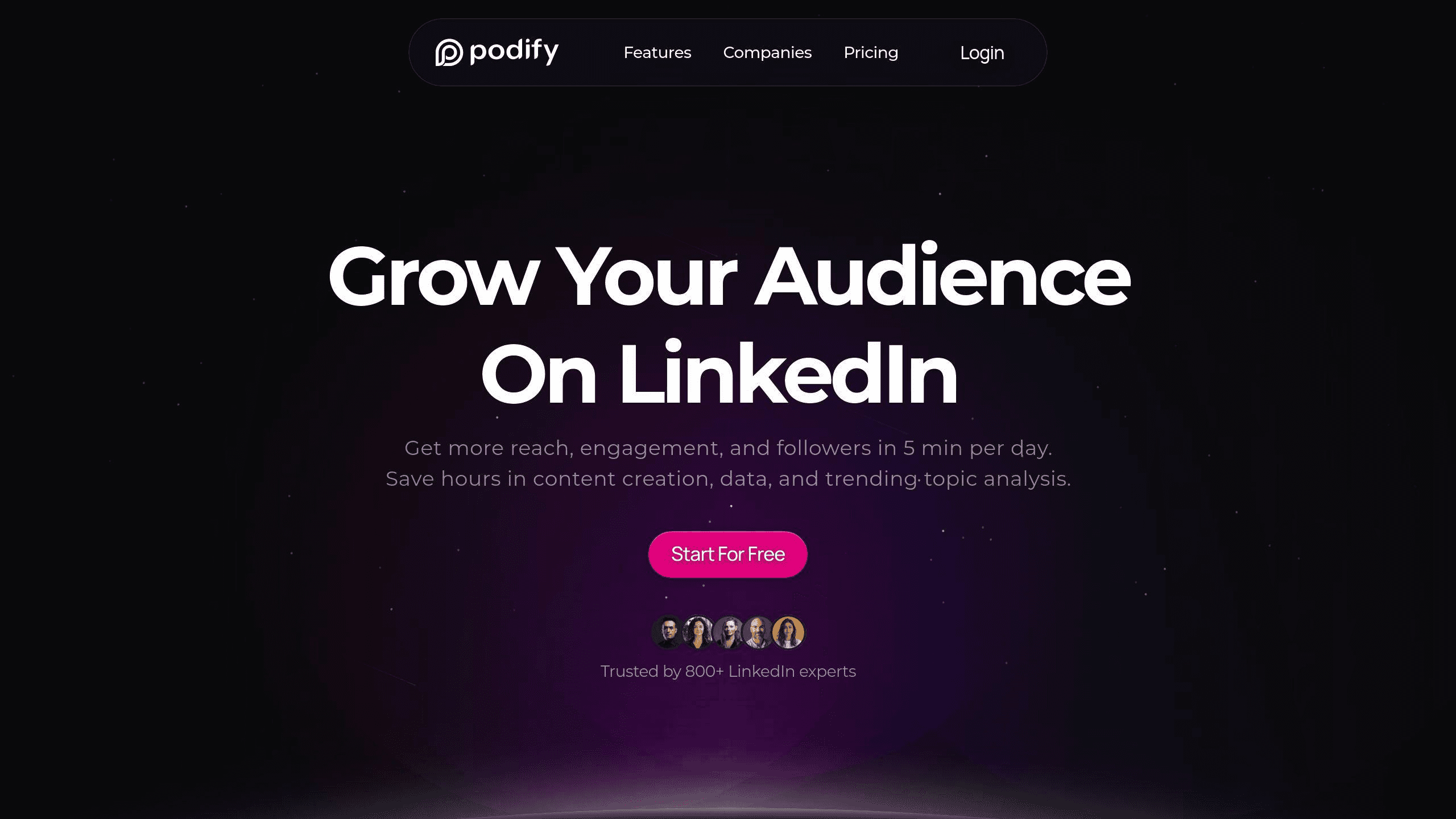LinkedIn Tips
Nov 5, 2024
●
11
min
LinkedIn Cross-Platform Content Strategy: 7 Steps
Want to boost your LinkedIn impact? Here's how to create a cross-platform strategy in 7 steps:
Check your current content
Set clear goals
Pick complementary platforms
Adapt content for each platform
Use cross-promotion
Leverage platform-specific features
Measure and adjust your strategy
Why use multiple platforms with LinkedIn?
Reach more people
Engage diverse audiences
Improve brand visibility
Show different sides of your brand
LinkedIn works best as part of a bigger picture. Use it to share insights and build thought leadership, then:
Tease LinkedIn articles on Twitter
Share behind-the-scenes on Instagram
Discuss LinkedIn posts on podcasts
Your goal: Create a cohesive online presence across platforms, with LinkedIn as a key player.
Quick Comparison:
Remember: Quality beats quantity. Focus on 2-3 platforms that fit your goals and audience.
Related video from YouTube
Check your current content
Start by looking at how your LinkedIn posts are doing. This helps you figure out what's working and what's not.
Measure LinkedIn results
LinkedIn gives you tools to see how your posts perform. Here's what to look at:
Impressions: How many times people saw your post
Clicks: How many times people clicked on links in your post
Engagement rate: (Clicks + Likes + Comments + Shares + Follows) / Total Impressions
You can find these numbers in LinkedIn Analytics. Track them regularly to spot trends.
Find your best posts
Look for posts with lots of likes, comments, and shares. These are your audience favorites. Pay attention to:
Popular topics
Content types that got the most engagement (text, images, videos)
Posting times (day and time)
Tools like Highperformr can help you do this quickly. They analyze your posts and show what worked best.
"Highperformr solves a critical missing piece in the modern B2B marketing playbook." - Rohit Maheswaran, Co-founder & Chief Product Officer, lifesight.
Look for patterns
Once you know your top posts, find common threads. This could be:
These patterns show what your LinkedIn audience likes. Use this info to plan future posts, both on LinkedIn and other platforms.
2. Set your goals
Setting clear, measurable goals is crucial for your LinkedIn cross-platform strategy. Here's how:
Choose clear targets
Pick goals you can measure. For example:
These goals are specific and time-bound. They give you a clear target.
Match your overall plan
Align your LinkedIn goals with your broader business objectives:
For lead generation, focus on increasing website traffic from LinkedIn.
For thought leadership, prioritize engagement rates on your posts.
Neil Patel, co-founder of NP Digital, says: "Your social media goals should directly support your overall marketing objectives. If they don't, you're wasting time and resources."
3. Pick other platforms
You've set your LinkedIn goals. Now, let's choose other social media sites to pair with it. This is key for a solid cross-platform strategy.
Find good matches
When picking platforms to go with LinkedIn, think about:
Where your target audience hangs out
What kind of content you make
Your business goals
Here's a quick guide:
For B2B? Focus on LinkedIn, Twitter, and Facebook. These three bring in 90% of social traffic to B2B sites. LinkedIn's the big player, driving 64%.
Check audience overlap
Look for platforms where your audience is active on multiple networks. This lets you reach the same people in different ways.
Use Google Analytics to see which social sites send traffic your way. This helps you spot good platform combos.
Say you get lots of traffic from LinkedIn and Twitter. These might be a great pair for you. Use LinkedIn for deep dives and Twitter for quick updates and chats.
"Don't spread yourself too thin. It's better to rock it on a few platforms than to be mediocre on many."
Start with LinkedIn and one or two others that fit your goals and audience. This way, you'll use each platform's strengths while keeping your brand consistent across channels.
4. Change content for each platform
When using LinkedIn in your cross-platform strategy, you need to tweak your content for different sites. Here's how:
Fit content to each site
Each social media platform has its own vibe. To make your content work everywhere:
1. Know the differences
LinkedIn likes professional, longer stuff. Twitter? Short and snappy.
2. Adjust your format
Change your content's length and style based on where it's going. For example:
3. Use platform-specific features
LinkedIn has polls and document posts. Twitter has threads. Use them!
4. Tweak your tone
Write differently for each platform. LinkedIn? Professional. Facebook? More casual.
Keep your brand consistent
While adapting, keep your brand recognizable:
Stick to your main message across platforms
Use the same visuals (logo, colors) everywhere
Keep your brand's personality, even as you adjust your tone
Use similar hashtags or calls-to-action to tie it all together
Remember: Your audience should recognize you, no matter where they find you.
5. Use cross-promotion
Want more eyes on your LinkedIn content? Cross-promotion is your friend. Here's how to do it right:
Share LinkedIn posts elsewhere
1. Pick your platforms
Go where your audience is. B2B? Twitter might be your jam.
2. Adjust your content
Tweak for each platform:
Twitter: Keep it short and sweet
Instagram: Make it visual
Facebook: Add a personal touch
3. Use built-in sharing
LinkedIn makes it easy. Just hit "Share" and pick your platform.
4. Schedule your shares
Tools like Buffer or Hootsuite can help you stay organized:
Podify.io: Your cross-promotion sidekick

1. Plan your content
Map out posts across platforms for a consistent message.
2. Track engagement
See how your cross-promoted content performs.
3. Get audience insights
Learn what works best where, and tailor your approach.
Cross-promotion isn't rocket science, but it does take some thought. Give it a try and watch your LinkedIn content reach new heights.
6. Use special features on each platform
LinkedIn has some cool tools to boost your content game. Let's check them out and see how to mix in features from other platforms too.
LinkedIn's toolkit
LinkedIn Articles
Want to show off your know-how? Write long-form content (up to 125,000 characters):
Slap on a 744 x 400 pixel cover image for max impact
Break it up with subheadings, bullet points, and short paragraphs
Don't forget a call-to-action to get people talking
Carousel Posts
Grab attention with multiple images or videos:
Turn a PDF into a carousel
Use visuals to tell a story or break down complex ideas
LinkedIn Live
Go live and chat with your network in real-time:
You'll need 150+ followers or connections
Perfect for Q&As, product launches, or industry chats
Creator Mode
Flip this on to expand your reach:
Showcases your favorite topics
Makes your content easier to find
Mixing in features from other sites
Cross-platform scheduling
Manage posts across multiple platforms with these tools:
Visual content creation
Use Canva to whip up graphics for LinkedIn and beyond:
Keep your visuals consistent across channels
Tweak designs to fit each platform's specs
Interactive elements
Spice things up with quizzes or polls:
Try LinkedIn's built-in poll feature
Share the results in a follow-up post or article
7. Check how you're doing
You need to keep tabs on your LinkedIn cross-platform strategy. Here's how:
Measure results across platforms
Track these numbers:
Engagement rate: (likes + comments + shares) / followers
Click-through rate (CTR): How often people click your links
Conversion rate: Visitors who take a desired action
Use Podify.io for analysis
Podify.io digs into your LinkedIn performance with:
Detailed post performance reports
Audience insights
Content optimization tips
Make changes based on results
Use your findings to level up your content:
1. Spot winners
What made your best posts tick? Do more of that.
2. Tweak timing
Post when your audience is most active.
3. Mix it up
4. Try new things
If something's killing it on other platforms, bring it to LinkedIn. Short videos working on TikTok? Test them here.
"Slow, authentic growth beats quick growth with uninterested followers." - Jennifer Heimann, AVP of Marketing Strategy & Operations, L&L Collective
Keep an eye on those metrics. Your strategy should evolve with your results.
Conclusion
Let's recap our LinkedIn cross-platform content strategy:
Check your content
Set goals
Pick platforms
Adapt content
Cross-promote
Use platform features
Measure and adjust
Connecting LinkedIn with other social media sites is a game-changer. Here's why:
You reach more people
Content ideas flow between platforms
You understand your audience better
Your brand looks consistent
You save time and effort
Check out these potential benefits:
The goal? Be effective, not just present. By linking LinkedIn with other platforms, you're creating a smarter approach to content marketing.
Keep testing and tweaking. You'll find the perfect mix for your brand and audience.
FAQs
What content strategy works for LinkedIn?
A solid LinkedIn strategy mixes up your content:
Articles
Short updates
Images and infographics
1-2 minute videos
Polls
Here's what to do:
Post 1-2 times weekly
Quality trumps quantity
Hook readers fast (first 3 lines)
Keep sentences short (under 12 words)
Add images to boost reach by 15-20%
Fun fact: 75% of B2B buyers use social media for purchasing decisions. So, create content that speaks to your ideal client's needs.
Can you cross post between Facebook and LinkedIn?
Yep, you can. These platforms play nice together due to similar post formats.
But here's the deal:
When moving Facebook content to LinkedIn:
Make it more professional
Cut casual language
Focus on business aspects
Add industry insights
"Cross-posting is a tactical way to reuse content across platforms. It's especially helpful for smaller businesses short on time."
Just remember: While cross-posting saves time, tailoring content to each platform's audience boosts engagement.
Share Post
